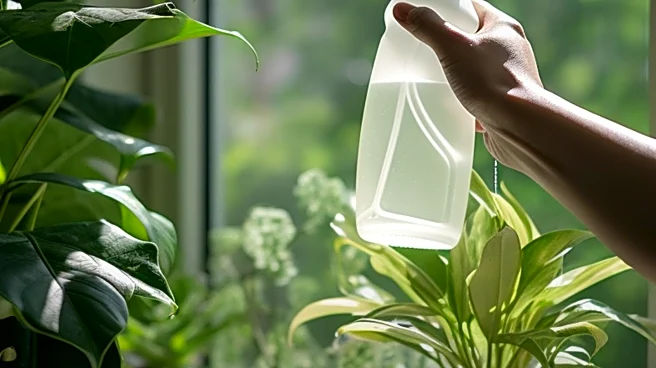What's Happening?
Houseplants require specific care to thrive indoors, including proper watering, lighting, and soil conditions. The key to successful plant care is moderation in watering, ensuring plants do not have 'wet
feet,' which can lead to root rot. Soil should be well-draining, typically a mix of peat moss, vermiculite, and compost. Light requirements vary, with some plants needing direct sunlight while others thrive in low light. Fertilization is important but should be done sparingly, with granules or water-soluble fertilizers applied according to plant needs. Regular rotation of plants in sunny locations ensures even growth, and maintaining stable temperatures between 65 and 85 degrees Fahrenheit is crucial to avoid plant stress.
Why It's Important?
Proper care of houseplants can significantly enhance indoor environments, improving air quality and adding aesthetic value. Houseplants like snake plants and peace lilies are known for their air-purifying properties, removing toxins and improving indoor air quality. Understanding the specific needs of each plant type can prevent common issues such as overwatering or insufficient light, which can lead to plant decline. This knowledge empowers plant owners to create healthier living spaces and promotes sustainable practices by reducing the need for frequent plant replacement.
What's Next?
As the popularity of indoor gardening grows, more resources and guides are becoming available to help plant enthusiasts care for their houseplants effectively. Innovations in plant care technology, such as moisture meters and smart plant care apps, are expected to become more prevalent, offering precise care instructions and monitoring capabilities. Additionally, the trend towards sustainable living may encourage more people to incorporate houseplants into their homes, further driving demand for plant care education and resources.
Beyond the Headlines
The cultural significance of houseplants is evolving, with many people viewing them as integral parts of their home decor and lifestyle. This shift reflects a broader trend towards biophilic design, which emphasizes the connection between humans and nature. Houseplants can also have therapeutic benefits, reducing stress and promoting mental well-being. As awareness of these benefits grows, houseplants may become more than just decorative items, serving as essential components of holistic health practices.









